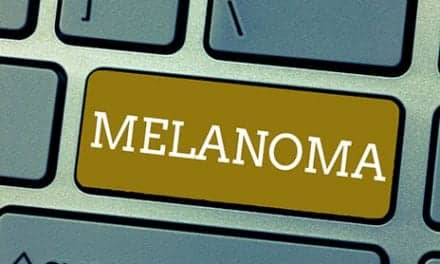Vismodegib (Erivedge™) may shrink and prevent the formation of basal cell skin cancers among patients with basal cell nevus syndrome (BCNS), a rare genetic condition that causes hundreds to thousands of skin cancers. BCNS is also known as Gorlin syndrome.
The new findings appear online in the New England Journal of Medicine.
“Patients in our study showed a dramatic reduction both in the growth of existing tumors and in the development of new tumors,” says study author Children’s Hospital Oakland Research Institute Senior Scientist and dermatologist Ervin H. Epstein, Jr., MD, in a press release. “The trial results were even better than we had hoped, with patients showing improvement in just one month of treatment. Not only did all the basal cell cancer tumors respond to treatment, but some subjects achieved near complete clinical remission.”
People with BCNS inherit one defective copy of a gene called PTCH1, which under normal conditions acts as a tumor suppressor by inhibiting the hedgehog (HH) signaling pathway. BCNS patients,however, have an increase in HH signaling, and tumors grow unchecked.
Enter Vismodegib. The new agent serves as a small molecule that replaces the function of the missing/defective PTCH1 gene.
This study included 42 participants receiving either oral vismodegib) orplacebo for a planned maximum participation of 18 months. Patients on the drug experienced an annual average of 2.3 new surgically eligible basal cell cancers, compared to an average of 29 for the patients in the placebo group. In addition to a decreased frequency of tumors, the size of the control group’s tumors present at the start of the study decreased by an average of 65 percent.
The results were so dramatic that the study’s data and safety monitoring board recommended switching all participants to the drug 15 months after the first patient was enrolled. The Food and Drug Administration approved vismodegib, manufactured by Genentech, Inc., for use in adults with metastatic and recurrent BCCs untreatable with surgery or radiation in January 2012. Adverse effects include muscle cramps and hair loss.
Michele Green, MD, a dermatologist at Lenox Hill Hospital in New York City called the new findings “a very important first step in human cancer therapy.”
This study followed last year’s approval of Yervoy for advanced melanoma which also helps the immune system to fight melanoma and offer some patients long-term survival. “What is exciting in science is that now through immunotherapy and understanding the basic genetic mutations involved in cancer, we are creating drugs that target these areas and will offer patients with terminal disease hope of long term survival,” she says.


